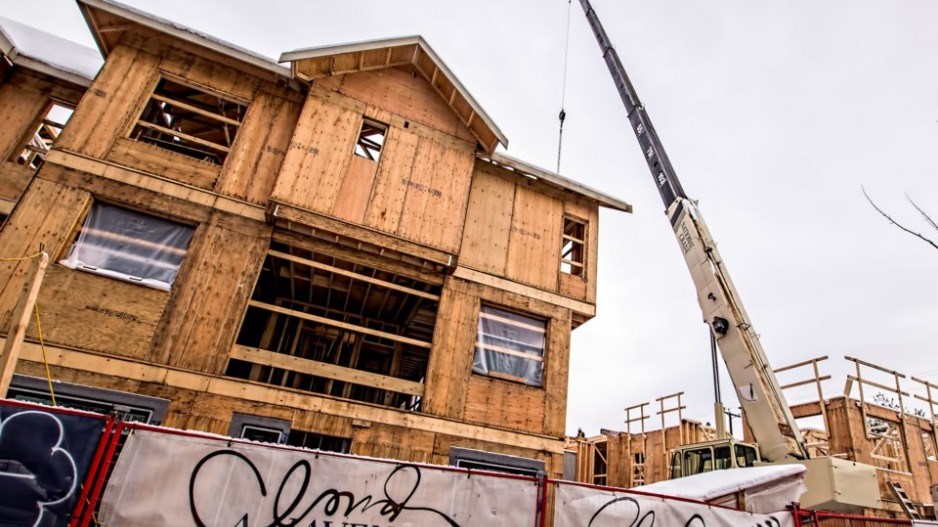British Columbia’s new Permitting Strategy for Housing aims to cut back on lengthy approval times for housing permits at the provincial level, but builders in the Sea to Sky say that the move must be paired with similar efforts at the municipal level.
Unveiled last month, the strategy will create a single, coordinated approach to housing-related permits and authorization, intended to speed up the approval process and eliminate the need for multiple applications across provincial ministries. This can include permits related to road rezonings, riparian area approvals, water licences, transportation approvals, and more.
“I think it’s great at the provincial level that they’ve recognized there is an issue and something needed to be done. The system was essentially broken,” said David Girard, principal at Whistler home builders Peak Ventures and director with the Sea to Sky chapter of the Canadian Home Builders’ Association (CHBA).
The new approach responds to a longstanding challenge in the industry: moving through a complex, multi-layered provincial approval process that “can be quite redundant and cumbersome,” according to Neil Moody, CEO of the Canadian Home Builders’ Association of British Columbia, in a statement on the non-profit’s website. “Between the initial application and approval, there can be a lot of back and forth between the builder and the different ministry staff. This can be very time consuming and can last months or in the worst cases, years.”
Girard welcomed the additional staff the province is bringing on to support the Permitting Strategy for Housing. The initial investment is for 42 new, full-time positions; once those roles are filled, the province said the team can be expanded to 203 positions.
“It would certainly be interesting to see if the municipality could do something like that,” Girard said of the added staff. “I think all the staff are working as hard as they can with what they have, but what they have isn’t adequate.”
Even by the slow-moving standards of local government, the Resort Municipality of Whistler (RMOW) has a reputation among local builders for its long turnaround times on permit approvals, a consequence of a number of contributing factors, including Whistler’s strict design and energy guidelines, staff shortages, and the pandemic-fuelled boom in home renovations over the past few years.
“Pre-COVID, there was certainly some long wait times, but nothing like they are now. I think the municipality is still rebounding from the online cyber-attack [that handcuffed municipal operations in 2021], so that was an issue. The whole COVID thing. But I think now we’re still seeing significant delays,” Girard said.
According to the RMOW, municipal staff are now reviewing building permit applications for residential and commercial properties that were submitted in October. “So that’s four months before they even review a permit application,” noted Girard. “I know in speaking with some of our colleagues and builders in Squamish, they are getting permits in four weeks. It shows you the distinct disparity there between what’s being experienced and what’s possible.”
There are currently 10 core staff tasked with processing 485 active building permit applications, and the RMOW said it is in the process of internally hiring a building technician, and is now recruiting for another full-time Building Official.
For its part, the RMOW is working on trimming permitting times locally. In October, elected officials adopted a bylaw that spread some of the decision-making authority across RMOW staff, designed to lighten the load on an already overburdened planning department, a move that was largely applauded by the local construction sector.
“Whenever you can find efficiencies, that helps everybody,” said Union of B.C. Municipalities president and local councillor Jen Ford. “It’s a challenging environment. There are no simple ways of doing this, but finding efficiencies will certainly help.”
There are currently eight core staff in the RMOW’s planning department tasked with processing 68 active development permit applications, in addition to two support staff. The municipality said it is also in the process of adding a planning analyst, a planning assistant, and a planning coordinator to its team.
Of the 48 development permits issued last year, the RMOW said processing times ranged from a month to nearly a year, with an average processing time of 5.6 months.
The CHBA has been clear about its call for change at the municipal level as well as at the province. In October, it released a study examining the permit approval processes in 13 B.C. municipalities, which revealed an average wait time of 13 to 14 months to approve rezoning and development permits, and more than 20 months for a subdivision application. To improve those wait times, the organization recommended Victoria create a provincial reporting system that would require municipalities to produce an annual, standardized report on development applications.
“The implementation of a transparent, reliable, and standardized source for timelines and quantity of approved housing data can ensure that supply shortages relative to housing demand can be anticipated and acted upon as early as possible,” the organization said on its website.
The province said its single application window would be established over the coming months, and in the meantime, permit and authorization decisions will be expedited through a cross-ministry Housing Action Task Force. Priority will be given to urgently needed housing projects, such as Indigenous-led developments, BC Housing applications, and multi-unit applications. Victoria said it will also prioritize projects in municipalities that are subject to B.C.’s housing and speculation tax, which does not apply to Whistler.
Find more information at news.gov.bc.ca/releases/2023WLRS0003-000033.




